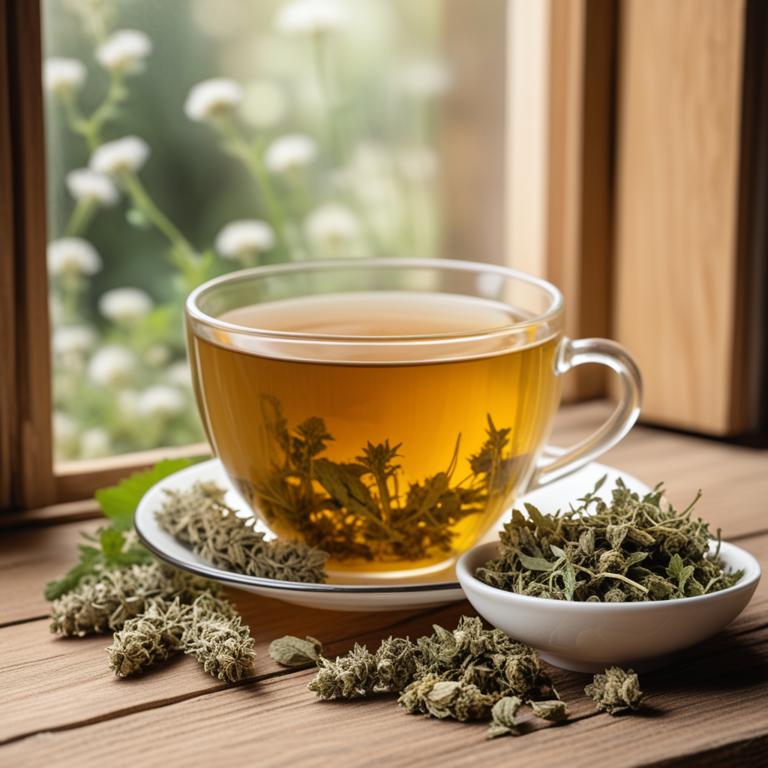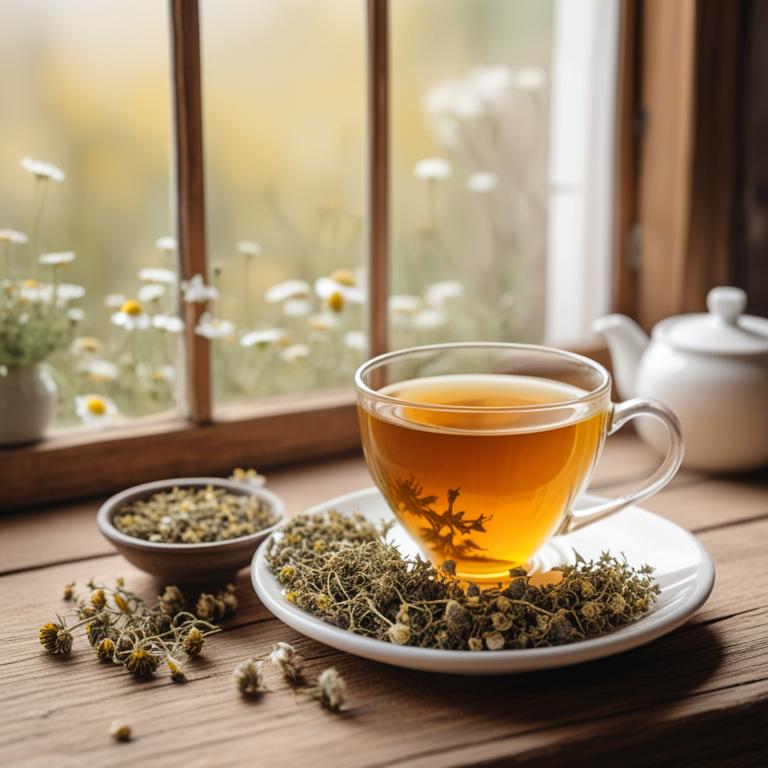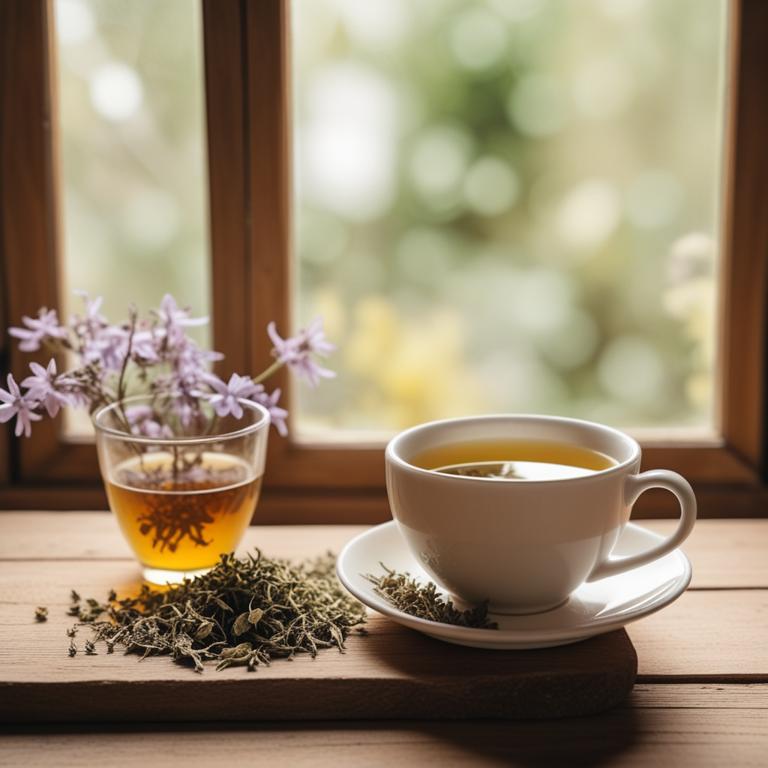9 Best Herbal Teas For Acne

Herbal teas for Acne are natural infusions made from plants and herbs that have been traditionally used to help alleviate and treat acne symptoms, which are characterized by inflamed skin and lesions.
These teas offer numerous benefits in treating acne, including reducing inflammation, balancing the skin's pH, and fighting bacterial infections.
Some examples of herbal teas that can be used to treat acne include peppermint tea, which cools and calms the skin, chamomile tea, which soothes and reduces inflammation, and green tea, which contains antioxidants that help prevent scarring.
Other herbal teas that have been used to treat acne include ginger tea, which reduces inflammation and promotes healing, turmeric tea, which contains curcumin that fights bacterial infections, and licorice root tea, which helps to balance the skin's pH and reduce inflammation.
According to "RSC advances", teas for acne may contain phytochemicals such as terpenes, terpenoids, flavonoids, alkaloids, phenolic compounds, saponins, tannins, and essential oils that have antibacterial, antioxidant, anti-inflammatory, keratolytic, and sebum-reducing properties, potentially helping to alleviate acne symptoms.
Below there's a list of the 9 best herbal teas for acne.
- 1. Melissa officinalis teas
- 2. Aloe barbadensis teas
- 3. Calendula officinalis teas
- 4. Chamomilla recutita teas
- 5. Cinchona officinalis teas
- 6. Hydrangea macrophylla teas
- 7. Glycyrrhiza glabra teas
- 8. Saponaria officinalis teas
- 9. Urtica dioica teas
Also you may be interested in...
TODAY'S FREE BOUNDLE
Herb Drying Checklist + Herbal Tea Shopping List + Medicinal Herbs Flashcards
Enter you best email address below to receive this bundle (3 product valued $19.95) for FREE + exclusive access to The Aphotecary Letter.
$19.95 -> $0.00
1. Melissa officinalis teas

Melissa officinalis teas, also known as lemon balm tea, have been traditionally used to treat acne due to its anti-inflammatory and antibacterial properties.
The bioactive constituents, such as rosmarinic acid and luteolin, help to reduce inflammation and fight bacterial infections that can cause acne.
By consuming Melissa officinalis teas, individuals can experience a reduction in acne severity and improved skin clarity, as the herbal preparation helps to soothe and calm the skin.
The benefits of using Melissa officinalis teas to treat acne include reduced redness, fewer breakouts, and a more balanced skin tone.
2. Aloe barbadensis teas

Aloe barbadensis teas have been used for centuries to treat various skin issues, including acne.
The anti-inflammatory and antibacterial properties of this herbal preparation help to reduce redness and prevent further infection, thereby treating the acne ailment.
Aloe barbadensis teas contain bioactive constituents such as aloin, aloe-emodin, and vitamins A, C, and E, which have potent antioxidant and anti-inflammatory effects that aid in soothing and healing the skin.
The benefits of using Aloe barbadensis teas to treat acne include reduced inflammation, improved skin texture, and a decrease in the occurrence of acne breakouts.
3. Calendula officinalis teas

Calendula officinalis teas have been used for centuries to treat acne due to their anti-inflammatory and antimicrobial properties, which help to reduce redness and prevent further infection.
The flavonoids and triterpenoids present in Calendula officinalis, such as quercetin and beta-sitosterol, exhibit potent antioxidant and anti-inflammatory activities that aid in healing acne lesions and preventing future breakouts.
By reducing inflammation and promoting wound healing, Calendula officinalis teas can help to minimize the appearance of acne scars and promote a smoother skin texture.
Regular consumption of Calendula officinalis teas may also help to balance the skin's natural pH and reduce the production of sebum, leading to a reduction in acne severity and frequency.
Related Study
According to "Evidence-based complementary and alternative medicine : eCAM", Calendula officinalis teas for acne show a significant reduction in inflammatory and noninflammatory acne lesions.
4. Chamomilla recutita teas

Chamomilla recutita teas have been used as a natural remedy to treat acne, a common skin condition characterized by inflammation and bacterial infections.
The anti-inflammatory and antibacterial properties of Chamomilla recutita teas help to reduce redness, swelling, and the production of sebum, which can clog pores and lead to acne.
The bioactive constituents, including apigenin, luteolin, and chamazulene, in Chamomilla recutita teas exhibit their therapeutic effects by modulating the immune response, reducing oxidative stress, and inhibiting the growth of Propionibacterium acnes, the bacteria responsible for acne.
Regular consumption of Chamomilla recutita teas has been found to provide benefits in managing acne, including reduced inflammation, improved skin clarity, and a decrease in the frequency and severity of acne breakouts.
Related Study
According to the study, Chamomilla recutita teas for acne may be beneficial due to its potential detergent action and keratolytic effects, which can help to evacuate impurities and debris from the skin, thereby reducing acne symptoms.
5. Cinchona officinalis teas

Cinchona officinalis teas have been traditionally used to treat acne due to their anti-inflammatory and antimicrobial properties.
The quinine and alkaloids present in this herbal preparation help to reduce inflammation and combat bacterial infections that contribute to acne, thereby promoting a healthy and clear complexion.
The benefits of Cinchona officinalis teas in treating acne include reducing redness and swelling, preventing the formation of acne lesions, and soothing irritated skin.
The bioactive constituents, such as quinovic acid and cinchonine, also contribute to its anti-inflammatory and antimicrobial properties, making it an effective herbal remedy for acne treatment.
6. Hydrangea macrophylla teas

Hydrangea macrophylla teas have been traditionally used to treat acne due to their anti-inflammatory and antioxidant properties.
These properties help to reduce inflammation and prevent oxidative stress, which can contribute to the development of acne.
The bioactive constituents of Hydrangea macrophylla teas, including flavonoids and phenolic acids, have been shown to exhibit antimicrobial and wound-healing properties, which can help to soothe and calm acne-prone skin.
The benefits of using Hydrangea macrophylla teas to treat acne include reducing inflammation, preventing scarring, and promoting healthy skin, making it a natural and effective alternative to conventional acne treatments.
7. Glycyrrhiza glabra teas

Glycyrrhiza glabra teas, also known as licorice root tea, have been traditionally used to treat acne due to their anti-inflammatory and antibacterial properties.
The polyphenols and flavonoids present in this herbal preparation help to reduce inflammation and prevent bacterial growth, thereby alleviating acne symptoms.
The bioactive constituents, such as glycyrrhizin and licochalcone A, have been found to exhibit anti-inflammatory and antimicrobial activities, which contribute to the treatment of acne.
Regular consumption of Glycyrrhiza glabra teas may help to reduce acne severity, prevent scarring, and promote skin health by regulating the balance of hormones and reducing oxidative stress.
Related Study
According to "Evidence-based complementary and alternative medicine : eCAM", Glycyrrhiza glabra teas for acne show that they significantly reduce inflammatory and noninflammatory acne lesions and have a relevant effect on acne severity, with no significant difference in sebum production and quality of life observed.
8. Saponaria officinalis teas

Saponaria officinalis teas have been traditionally used to treat acne due to their anti-inflammatory and antibacterial properties.
The herbal preparation helps to reduce inflammation and prevent the growth of bacteria that cause acne, thus promoting clear and healthy skin.
The bioactive constituents, including saponins and flavonoids, found in Saponaria officinalis teas possess antioxidant and anti-inflammatory properties that aid in reducing acne severity.
By incorporating Saponaria officinalis teas into a treatment plan, individuals can experience improved skin health, reduced acne breakouts, and a more even skin tone.
Related Study
According to "Evidence-based complementary and alternative medicine : eCAM", Saponaria officinalis teas for acne may be beneficial due to their ability to inhibit sebum production and the growth of Cutibacterium acnes, as well as exhibit anti-inflammatory and antimicrobial activities.
9. Urtica dioica teas

Urtica dioica teas, also known as nettle leaf tea, have been used to treat acne due to their anti-inflammatory and antibacterial properties.
The herbal preparation helps to reduce inflammation and prevent bacterial growth, thereby reducing acne symptoms and promoting skin health.
The bioactive constituents present in Urtica dioica teas, including flavonoids and phenolic acids, help to inhibit the production of pro-inflammatory cytokines and reduce oxidative stress, which can contribute to acne.
Regular consumption of Urtica dioica teas may help to reduce acne severity, improve skin texture, and promote overall skin well-being.